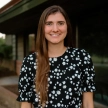Meet Isabel, an MA Political Communications Student
Investing in my future at DCU.

Isabel
Hello! My name is Isabel, and I’m a postgraduate student at DCU, studying Political Communication. I’m originally from Kentucky in the US and moved to Dublin from Ohio where I spent the last two years working for a nonprofit, nonpartisan operating foundation that works to advance inclusive democracy.
I originally planned to study for a master’s degree right after finishing my bachelor’s degree. However, I decided that first gaining professional experience and exposure would better inform my interests and professional goals. Pursuing a master’s degree was a big decision and investment for me, so I wanted to be sure the program I selected was both intellectually stimulating and practical professionally.
I first became interested in studying in Ireland when I was researching deliberative democracy at work and learned about the Irish Citizens’ Assemblies—a process in which members of the general public are invited to address societal issues and make recommendations to the Oireachtas (the Irish Parliament). I also learned that one of the scholars at the forefront of the deliberative assemblies was a professor in the School of Communications at DCU. Having academic interest and professional experience that was directly related to the professor’s research interests, I requested an informational interview. The professor graciously agreed to meet with me via Zoom and we discussed upcoming research projects and potential opportunities at DCU. The professor also connected me with a current student in the Political Communication program, who shared her insight and experience with me.
The MA in Political Communication program examines how the media, politics, and the public interact, and how these interactions affect democracy and distributions of power. It addresses several critical issues in the realm of politics and media, including fake news and the influence of mis- and disinformation. A few of the core modules are media, politics, the public sphere, social media, journalism, democracy and information, manipulation and democracy. In addition to finding the modules both interesting and extremely relevant in today’s political climate, the course stood out to me for a few reasons.
First, there are few courses like it in the US. The specificity of this MA emboldened me to pursue my graduate degree abroad. Developing a global perspective and cross-cultural awareness is invaluable for someone interested in pro-democracy work. The Political Communication program adopts comparative and global perspectives, analyzing places like the US, UK, Italy, and Germany. Rather than focusing exclusively on the Irish political communication landscape, Ireland is used as a point of international comparison and as a case study when discussing broader global trends.
A second distinct feature of the Political Communication course is that it includes a guaranteed work placement for full-time students. Despite intending to and wanting to pursue a master’s degree, I found it difficult to commit to full-time study, in part, because I was used to working full-time and supporting myself. Returning to school as a full-time student meant devoting a significant portion of time and resources while accepting a reduced income. The work placement ensures students are maximizing their investment, applying their academic knowledge, and gaining industry experience while also supporting themselves.
Pursuing a master’s degree is a big investment, that understandably may cause some anxiety or uncertainty. What I found most helpful in my decision-making process was considering both the short-term and long-term costs and benefits. For instance, in the short-term, it was important that I was genuinely interested in what I was studying. While that may sound obvious, it is worth reflecting on your motivation to learn more about your subject matter. After finishing my bachelor’s degree, it took time for me to discover what I was interested in pursuing in a professional setting and also allow my interests to continue to evolve. In the long-term, I was concerned with how my studies would apply to and enhance my contributions in a professional setting. The combination of academic and professional aspects in the Political Communication program assured me that students were set up to succeed in the program and in the industry.
At DCU, I have found that authentic interest and engagement is often met with insightful and supportive responses. Professors are often highly active in their field, participating in both nationally and internationally funded projects and regularly publishing research. Students who wish to engage and learn are often steered towards opportunities to do so.
I encourage anyone thinking about studying a master’s to reflect on their passions, and how that can be channeled into a meaningful career. Nearly at the half-way point in my program, I am very pleased with my decision to study Political Communication at DCU, as I know I am investing in my future.
Pupil profile:
Dublin City University
Our top picks
Related roles
Trending in Charity, public & civil service
You might be interested in...
.webp)

_1.webp)

.webp)
.webp)
.webp)
-min.webp)
-min.webp)





.webp)










